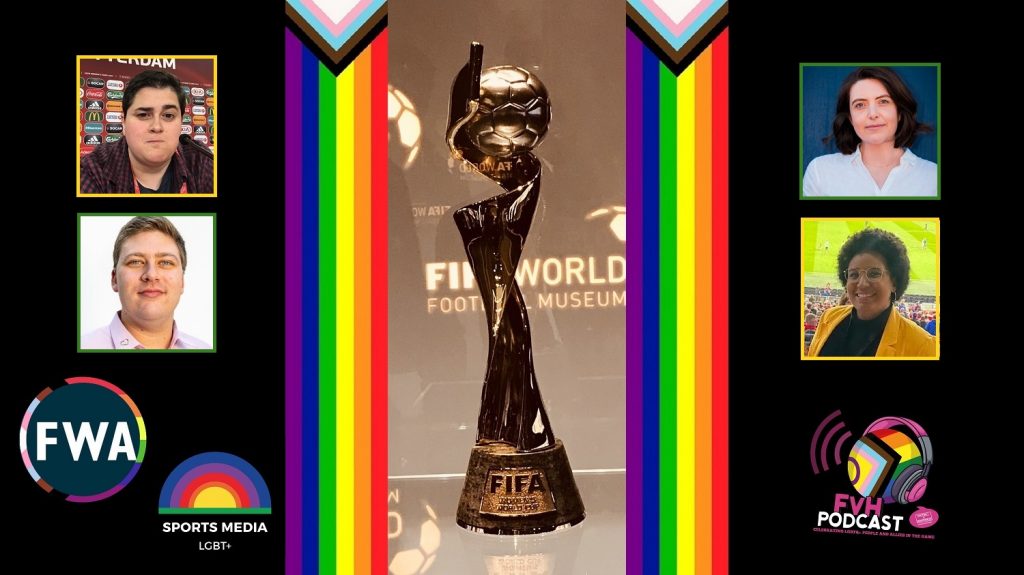‘Absolutely a different vibe!’ – Football writers discuss Women’s World Cup on Pride podcast special
Football Writers’ Association and Sports Media LGBT+ celebrate ongoing partnership with another special Pride episode of the Football v Homophobia Podcast; ESPN’s Sophie Lawson, Guardian writer Júlia Belas, ABC’s Samantha Lewis and freelancer Poletti look at LGBTQ+ themes at the Women’s World Cup…

It would be no surprise if players at the FIFA Women’s World Cup in Australia and New Zealand choose to speak out on social issues such as LGBTQ+ rights.
That’s the view of guests on a special podcast episode to mark the ongoing partnership between the Football Writers’ Association and Sports Media LGBT+.
For the third year running, the industry groups are exploring the connections between covering the global game and the growing representation of football journalists from the LGBT+ community.
The latest chat – looking at the link between Pride and the Women’s World Cup – is available to listen to now on a new episode of the Football v Homophobia Podcast.
Joining host Jon Holmes is FWA member and ESPN writer Sophie Lawson; British-based Brazilian journalist Júlia Belas; and Zooming in from Australia, ABC reporter Samantha Lewis and freelancer Poletti.
All four will be in Oz to cover the tournament in July and August.
On the pod, they each discuss stand-out moments, talking points and memorable players from past tournaments, all through a rainbow-tinted lens; and they share their expectations for the forthcoming edition, such as the contrasts with the men’s World Cup in Qatar.
Samantha has been following the general build-up in Australia closely while also contemplating the LGBTQ+ links.

“There is absolutely a different vibe,” says Sam. “There’s this desire to celebrate, to be visible and to really embrace what’s always been a key part of the community within the game.
“Even speaking to folks at FIFA and Football Australia, they are much more relaxed about the idea that some national teams and players might want to use this platform to send messages, engage in issues, ask questions and be role models.
“That in itself is quite telling of the space that women’s football has created for itself. It’s far more open to its overlap, to engaging in conversation on larger social issues and there are so many proud out queer women who are going to be front and centre here.
“They have their stories out in the world now. I’m really excited for what this tournament is going to look like.”
By way of introduction, each of the guests describe their career journeys thus far – with passion fuelling all of their paths into the industry.

“I was self-funding, writing for outlets that weren’t paying but were getting me into press boxes and getting me exposure,” says Sophie, looking back at how she started out.
“It was a labour of love, if you will, and that kept me going for a few years before I started getting a few more paying gigs. It’s tough being a freelancer when you’re battling so much, and in a women’s sport.”
Júlia has found more opportunities in the UK compared to her homeland.
“Most of the time when I was working in Brazil as a sports journalist, I would write about women’s football on my own personal time, go to games and talk to people on my days off.
“Here, I’m actually being paid to do that which is amazing! I’m also doing a PhD on women’s football so it’s great to be working in the industry and studying the subject.
“It gives me a lot of access – and I’m really excited to go to my first Women’s World Cup.”
Down Under, it’s been much the same for Sam.
“I started off writing for fun because I enjoyed it so much – I felt this righteous fury that these games weren’t being covered by anybody!
“I wanted to give exposure to these amazing women playing in the W League and state competitions.
“I wasn’t planning on becoming a journalist – I was actually doing a PhD in higher education. But I went across to the Women’s World Cup in France with friends and offered to do a travel column on the Matildas while I was over there. Someone said yes and then I thought, ‘oh crap, now I have to do it!’
“But when I came back, all these opportunities began to open up for me.”
Poletti has persisted in their pursuit of football journalism, despite the fierce competition.
“The first obstacle you have to overcome is that there are often five jobs and 2,000 people going for them!” they say.
“Unless you’re lucky, it’s freelancing and you have to hope for the best.
“I never intended for this to be a career choice. A friend launched an outlet during Covid and I gave it a go, before realising I had a knack for it, then when that closed down I went to the Inner Sanctum.
“I dived into everything else headfirst and that’s how I ended up where I am. I also find I’m breaking down barriers for non-binary people and now we’re seeing more diversity in the women’s game.”
Sports Media LGBT+ is a network, advocacy, and consultancy group that is helping to build a community of LGBTQ+ people and allies in sport. We’re also a digital publisher and can help with your content requirements. Learn more about us here.
We’re interested in your news and stories. Share with us and tap into a worldwide audience through our Google News affiliate website which attracts thousands of visitors, and our popular social channels. Contact us to discuss how we can help you.


